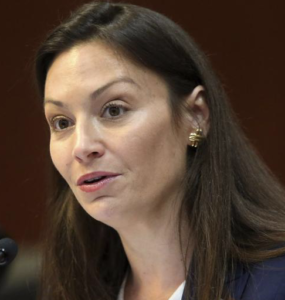By John Haughey
The Center Square
October 8, 2019

Florida Agriculture Commissioner Nikki Fried’s 2020 legislative package calls for expansion of solar power, improvements to energy storage grids and a study of energy efficiency for all state facilities.
Fried, Florida’s only Democratic statewide elected official, released her 2020 renewable energy plan at a Tampa press conference Thursday flanked by Democratic U.S. Reps. Charlie Crist and Kathy Castor, and state Rep. Margaret Good, D-Sarasota.
“The science is clear that we have a cause and a crisis that is urgent,” Fried said. “We need action now, and we need to be taking it together.”
The press conference was held on the final day of the 2019 Florida Energy & Climate Summit, the first state-level summit to address climate change since 2008 under then-Governor Crist, presented by the state’s Office of Energy and Fried’s Agriculture Department.
“It’s time as the nation’s third largest state – using the third-most energy – to face the facts on climate change and energy efficiency, and start preparing for the future,” Fried said. “There’s no time to wait.”
Fried stressed the economic advantages of environmental innovation, referring to studies that show greenhouse emissions in Florida have increased by 400 percent since 1950.
“Florida consumes 800,000 barrels of oil a day,” she said, noting about 900 people a day are moving into the state. “We have no choice but to make changes.”
Fried wants lawmakers to allocate $20 million over five years to create a “nationally-recognized clean energy research center” to be located at one of Florida’s state universities and a law allowing the state to lease man-made stormwater management systems to utilities and solar developers for floating solar arrays.
Fried wants lawmakers to allocate $10 million over four years to fund resiliency research and development for an agriculture energy water ranch program and has requested $250,000 for climate adaptation and mitigation strategies.
Fried previously unveiled several other energy and climate-related items in her FY21 legislative budget proposal, including:
• Low-Income & Infrastructure Studies: Two studies, proposed at $150,000 each, to study the energy burden on low-income communities and how social, economic, and environmental factors impact energy usage, and on infrastructure improvements needed to support renewable energy and battery storage.
• Utility Grid Pilot Project: Proposed at $1 million, a utility pilot project to install and test grid storage technologies to demonstrate increased grid efficiency and resiliency, including for electric vehicle charging.
Fried is also requesting $5 million over five years to pay for an 80-percent cost share program for up to $25,000 on improvements.
In addition, the Agriculture Department is seeking money for irrigation upgrades and pump improvements on the Suwannee River, and for more grants for agriculture research and development.
Castor, chair of the House Select Committee on the Climate Crisis, said Florida has lagged behind in developing solar energy.
“Florida has great potential for solar energy,” she said in the press conference. “Why isn’t it happening? Powerful special interests, just like in Washington, D.C., are at work in Tallahassee blocking the change we need.”
Good said lawmakers will address stormwater and wastewater issues this session, stating the bipartisan concensus on environmental funding for water quality projects is a welcome departure from previous years.
“Throughout this process, I have seen a shift from denial and inaction to cooperative action,” she said.
In a widely-published Friday op-ed, Fried said the 2019 Florida Energy & Climate Summit in Tampa underscored the need for quick, coordinated action on climate change.
“What we learned is that we need partnerships to take on climate change together, we need investments on energy efficiency, resiliency and mitigation, and we need innovation to meet these challenges,” she wrote.
Reiterating her call to repeal the Florida Energy Efficiency & Conservation Act (FEECA), Fried wrote that the state needs “meaningful energy efficiency standards.”
“For 40 years, FEECA has failed to establish reasonable goals for our state’s utilities. FEECA was supposed to reduce demand for new power plants — yet since 2014, five new fossil fuel facilities have been approved, including one I voted against in July,” she wrote. “Since 2009, energy efficiency goals for utilities have spiraled downwards — and are now at, or near, zero.
“That’s unacceptable,” Fried continued, “and it’s why last week, I called for a new, statewide dialogue about holding utilities accountable for real energy efficiency and conservation standards. What we have now isn’t working, and we need to start over.”
